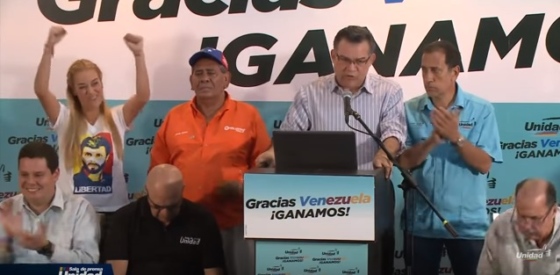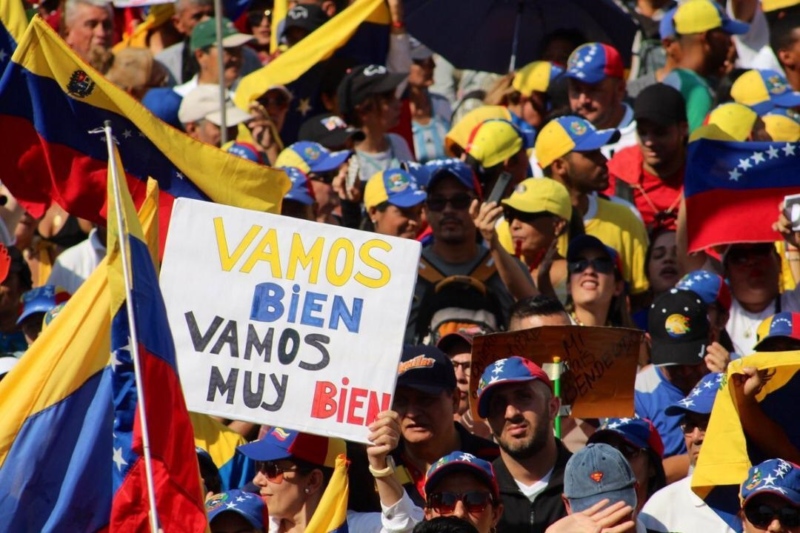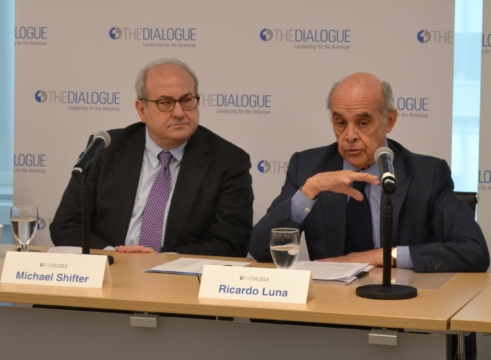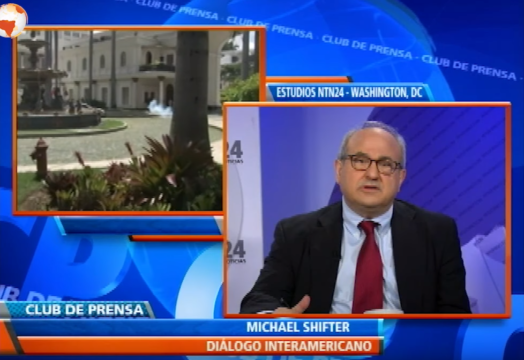
What Does the Future Hold for Venezuela?
What do the election results mean for President Nicolás Maduro and his grip on the presidency?
A Daily Publication of The Dialogue
The prices of Venezuelan government bonds rallied after National Assembly President Juan Guaidó declared himself the country’s legitimate president and won official recognition from numerous countries, including the United States. Just days later, trading of bonds slowed down after the U.S. Treasury Department clarified its new sanctions included Venezuelan government-issued bonds. To what extent are investors seeing Venezuelan debt as a good deal, and to what extent will U.S. sanctions affect trading? What would happen to Venezuela’s defaulted bonds if President Nicolás Maduro steps down, and what would happen to them if he remains in power? Is it growing more or less risky right now to hold Venezuelan debt?
Michelle DiGruttolo, senior managing director at Ankura, and Jay Squiers, managing director in the firm’s energy restructuring office: “The latest sanctions will ensure that trading on both Venezuelan government-issued bonds and PDVSA bonds remains at a virtual standstill. As Maduro continues to resist pressure to resign, sanctions will increasingly restrict his access to cash and hinder his ability to move petroleum. As a result, he will struggle to pay the October 2020 PDVSA bond, increasing the risk of default on the Citgo-collateralized loan. The opposition has moved to appoint a new board of directors for Citgo. U.S.-based executives of Citgo may recognize the new board and cooperate in an effort to avoid a PDVSA-bond default. A default on those bonds would place the refiner’s equity ownership at the center of foreclosure battles involving bondholders, both Venezuelan presidents and Rosneft, which holds half of the Citgo-collateralized PDVSA bonds. If Citgo declares a dividend, under direction of the newly appointed directors, they could direct the dividend to fund the required payment on the PDVSA bonds to avoid default. As a prime source of hard dollars through both its earnings and crude oil purchases, Citgo will be the most valuable asset of a new Venezuelan government, and preserving its ownership without allowing any funds for the existing Maduro government is the most pragmatic course of action. A Maduro exit would create uncertainty until the new government decides which bond issuances and other obligations they will honor. The risk remains high as long as there are two parallel governments. Irrespective of who triumphs, we anticipate a lengthy restructuring battle with all parties taking a haircut.”
Javier Coronado, associate attorney at Diaz, Reus & Targ: “Based on the notion that international pressure would soon lead to a new government with which creditors could negotiate payment, investors were seeing Venezuelan bonds as a good deal. However, under the amendments that the U.S. Office of Foreign Assets Control (OFAC) made to its regulations on Feb. 1, first, U.S. persons can no longer purchase any additional bonds; second, current bondholders can transfer such bonds to non-U.S. persons only; and third, U.S. financial institutions involved in a transfer or divestment of Venezuelan bonds must review all information that is or should be in their possession to confirm that such bonds are not being transferred to U.S. persons. As a result, the regulations issued by OFAC have nearly paralyzed trading of Venezuelan bonds. The U.S. government will not roll back its sanctions as long as Nicolás Maduro is in power. Accordingly, if he does not step down, investors with defaulted bonds will possibly need OFAC’s authorization to enter into a restructuring agreement with the Venezuelan government or to pursue U.S. legal actions stemming from such bonds. While Maduro’s stepping down could expedite the investors’ path to recovery, it is uncertain if a new government in Venezuela would have debt servicing as a priority, especially if it is in need of massive amounts of capital. Against this backdrop, and considering that the U.S. government could issue additional sanctions targeting Venezuela in the coming days, it is certainly growing riskier to hold Venezuelan debt.”
Jose Pineda, senior consultant at DevTech Systems and adjunct professor at Sauder University of British Columbia: “First, Juan Guaidó did not ‘proclaim himself’ president. As president of the National Assembly, he has assumed the powers of interim president in accordance with Article 233 of the Venezuelan Constitution, given the end of the presidential term and the illegitimate elections held last May. The Maduro government’s inconsistent macroeconomic policies resulted in a significant GDP contraction and hyperinflation before any significant U.S. sanctions were in place, so the latest sanctions (including those on PDVSA) just complicate an already difficult outlook for Venezuelan debt holders. If Maduro stays in power, the Venezuelan economy will continue its meltdown, and markets will not get any credible promise of payments. On the contrary, Guaidó mainly brings upside risk to the Venezuelan debt, even after an orderly debt restructuring process that guarantees payments to debt holders and access to financial markets for the Venezuelan reconstruction. Guaidó has already presented some ideas about his economic stabilization plan, which proposed anchoring the bolívar currency with respect to the U.S. dollar. The plan also includes the privatization of the many companies nationalized during the Chávez and Maduro governments, stopping the monetization of the fiscal deficit by the Central Bank and strengthening its autonomy. These are critical initial steps for the Guaidó administration to restore credibility.”
The Latin America Advisor features Q&A with leaders in politics, economics, and finance every business day. The publication is available to members of the Dialogue's Corporate Program and others by subscription.
What do the election results mean for President Nicolás Maduro and his grip on the presidency?
The Inter-American Dialogue hosted a private roundtable event featuring Ricardo Luna, the Peruvian Minister of Foreign Relations. The discussion highlighted the Minister’s position on the best way for the international community to handle the crisis in Venezuela and how to confront infrastructural-based corruption throughout Latin America. Minister Luna also addressed some of the upcoming plans his government has in its preparation to host the eighth Summit of the Americas next March in Lima.
El ataque a la Asamblea Nacional en Venezuela, tensiones diplomáticas con Corea del Norte, y la reunión del G20 en Hamburgo – temas de discusión en este programa de Club de Prensa. Presentado por Juan Carlos Iragorri, con la participación de Xavier Vilà, periodista y analista catalán; José López Zamorano, corresponsal jefe de ‘Notimex’ – México; Michael Shifter, presidente del Diálogo Interamericano.
 Thousands of Venezuelans took to the streets across the country on Feb. 12 calling for international humanitarian aid to be allowed entry. // Photo: @jguaido via Twitter.
Thousands of Venezuelans took to the streets across the country on Feb. 12 calling for international humanitarian aid to be allowed entry. // Photo: @jguaido via Twitter.

 Video
Video